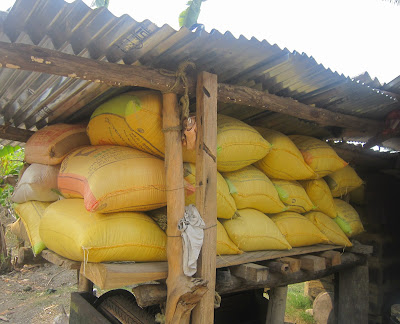I mean it. Seriously. Don’t ever propose girls in Dzongkha. I’ll tell you why. Dzongkha is terribly unromantic language. Because, ermm, it’s a loud hectoring accented language and has far, far fewer romantic terminologies. You cannot admire a girl in Dzongkha, you cannot even like her. But you can only propose her. Bluntly. Unchivalrously. Like this, Nga gi tshey lu ga! And any girl would be shell-shocked to hear this, all at once. Huh, this makes your courting offensive and expression of love dull. That’s why, often, you hear many guys becoming penlop, rejected by girls. Whew, don’t propose girls in Dzongkha.
In the past Dzongkha was spoken in dzongs. This was the language used by Buddhist monks and the administrative staff in dzongs. And those days, during Zhabdrung’s reign and even after his death, the dratshangs and administrative posts in dzongs were all occupied by men. Now just imagine how administrative staff in those days would speak to each other. Full of masculinity, loudness. Again, imagine when monks were smitten with leather whips what kinds of words kudrung would utter. Unmerciful. Monstrosity.
And from where Dzongkha originated? Ahem, from western Bhutan, from Ngalong, isn’t it? Ngalong, in no doubt, are people with nga-gyel-excessive pride and promising ego. Sorry for being so blunt, but it’s quite true. With pride and ego, comes sternness and masculinity. Am I right? You see Ngalonpa have this attitude. Overpowering and dominating and are resolute to rule others. So, frankly, do I tell you their language, Dzongkha, too is equally astute and egoistic.
If you don’t believe me, watch people locking horns. Even if they’re Sharchop or Kheng or Lhotsham, they go raving and ranting all in Dzongkha-perhaps to potentially wreak terror over their opponents shouting with help of language. Dominating language, Dzongkha. Rolling up their gho or tego sleeves, they fight. Jedha. Shek taw mey. Jhandey.
You may grudgingly admit it, but Dzongkha is a language of domination. It’s one-way-traffic language. As was our customary, only parents (especially fathers) and officials holding high ranks do the talking. Barking orders. From top to bottom. Women, children and subordinates were kept silence and were speechless and powerless. Theirs only responsibility was to show respect. Bowing down, in due submission, so low, “Laso la, laso la.” That’s their only language, voice.
Dzongkha had worked to perfection for leaders of Bhutan-Je Khenpos, Penlops, Desis, Dzongpoens and Kings. Even today watch our leaders speaking, Dzongkha suits them so perfectly. But watch an ordinary man speaking Dzongkha, it proves a menace. Ugh, he sounds disrespectful and disdainful. It’s even worse when a woman speaks it. Because Dzongkha language contains so much of anger, enrage and loud hectoring accent. And anyone speaking it seems he/she is an angry person and overpowering.
And even today visit any government offices in Bhutan and ask for a small favour from officers. They’d only throw at you a scornful look. “Ahh! Nga meshey!” they’d scold you back, in Dzongkha. And all in your mind only, you’d react (tempers boil over), “Jedha!”
This could be one solid reason why youth, today, lost interest in learning Dzongkha. Today’s youth are in love and they want to express love, feelings. That’s why they write love letters or exchange greetings cards only in English.
Note: This post is overtly sensitized, and for fun reading only.
Photo courtesy: Trekearth.com















